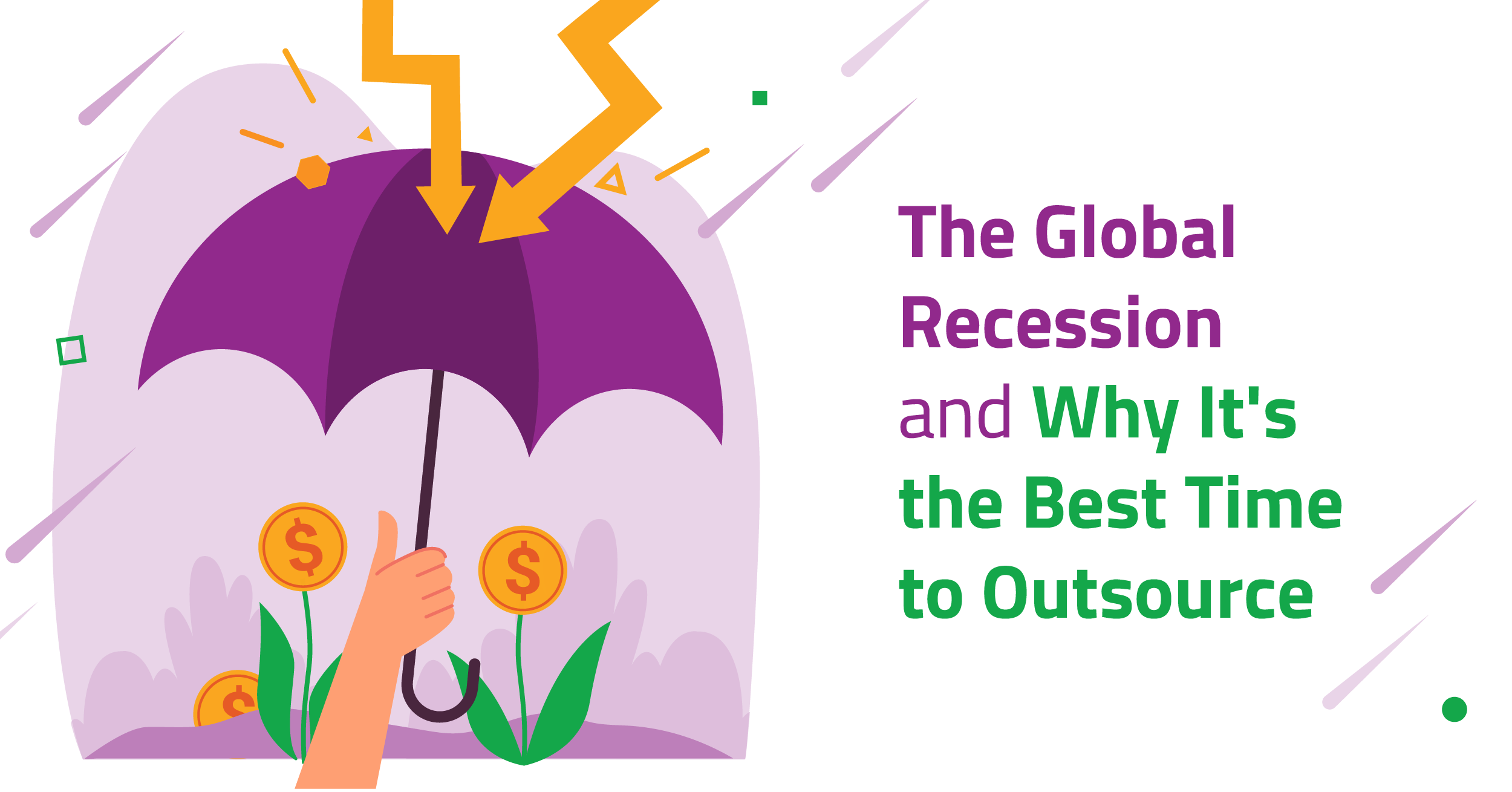The Global Recession and Why It’s the Best Time to Outsource

Prices are skyrocketing, costs and weakening demand challenge corporate profitability, and global unemployment rates are projected to rise by three million in 2023, a reversal from the decline experienced in recent years.
With these indicators and three of the world's biggest economies slowing down, economists are predicting a global recession is looming on the horizon. However, there is still time and ways to minimize its possible impact on your business.
A recession is a significant, widespread, and persistent decline in economic activity.
During this time, economic output, employment, and consumer spending drop. Interest rates also decline as banks cut rates to support the economy, widening the government's budget deficit due to low tax revenues. A recession usually lasts a few months, with the COVID-19 recession of 2020 only lasting two. However, data shows that the economy might not recover to its former peak for several years.

Photo by Andreas Brücker on Unsplash
What causes a recession?
All recessions have different causes and effects, including financial, psychological, and economic factors. Economies experiencing growth are more likely to experience a slump as it is part of an economic cycle. Here are three factors that cause a recession:
- Financial factors. Credit growth and accumulation of financial risks during good economic times can lead to a recession. Other causes include overextension of credit and debt on loans, leading to a risk buildup in the financial sector. Additionally, expanding the supply of money and credit in the economy can drive this process to extremes, creating asset price bubbles.
- Psychological factors. Over-enthusiasm during economic booms and deep pessimism during downturns may cause a recession. For example, the 2008 Global Financial Crisis was partly a result of irresponsible speculation that led to a bubble in the U.S. housing market.
- Economic factors. Structural shifts in industries, such as a sharp and sustained surge in oil prices, can raise costs across the economy and contribute to a recession. There are also economic factors tied back to financial markets. A central bank's suppression of interest rates during the boom years distorts financial markets and business decisions further, which, over time, can lead to a recession.
Recessions are usually only clearly identified after they are over.
However, there are several indicators businesses and investors look out for in determining if a recession is about to occur. These include the decline of equities markets and rising unemployment rates. Other key indicators of a recession are the following:

Global economic decline
As of January 2023, the three biggest economies – the United States, China, and the European Union—are slowing simultaneously. These three economies account for roughly half of all global output. Their economic slowdowns are due to a variety of factors such as interest-rate hikes and tightening monetary policies. Such a simultaneous economic decline is unusual and indicates a global recession is looming on the horizon.
Inverted yield curve
Long-term investment stocks have a higher yield than short-term investments. The reversal of this phenomenon is called an inverted yield curve, an indicator of a pending recession.
When short-term interest rates exceed long-term rates, market sentiment suggests that the long-term outlook is poor and that the yields offered by long-term fixed income will continue to fall. Such a negative outlook stems from the simultaneous decline of economies across the globe, psychologically affecting markets.
Small business slow-down
The International Monetary Fund expects global growth to slow from 3.4% in 2022 to 2.9% in 2023. Due to their vulnerability, small businesses are already experiencing the effects of an economic slump. The overall small-business optimism is at the lowest it has ever been since June 2022.
Additionally, business owners are already worrying about the looming recession this year, citing inflation, economic uncertainties, and difficulty in hiring the right people as the leading causes.
Outsourcing during a recession will help you weather the effects of the global economic downturn.
Outsourcing allows you to focus on scaling your business and ensures that experts handle non-critical functions, enabling you to direct your time and energy to your company's core functions. Additionally, this business strategy puts you in a better position to handle the demands of a recession.
Here are three ways outsourcing benefits your business in a recession:
Flexibility in resourcing
Businesses need options to stay competitive and survive during a recession without blowing up their budget. With outsourcing, you can easily identify and manage resources as needed, allowing your business to continue taking on projects without worrying about adding as much overhead costs.
Additionally, outsourcing doesn't limit you to only a specific range of skills. You can also engage with outsourcing partners aligned to a particular project or support requirement timelines.
Cost savings
Outsourcing gives your company the leverage to reduce costs for duties requiring only a few experts instead of a whole team. In StraightArrow, we have different levels of support depending on your business needs, whether it's project-based, or an extension team. Project-based services are part-time arrangements performing specific tasks or working on completing one project. In contrast, an extension team or dedicated support services involve full-time individuals or teams working exclusively on your business needs. Only availing the scale of services necessary is cost-efficient because you're only spending what you need to.
These lower costs allow you to leverage your in-house workforce to focus on more strategic tasks while your outsourcing partner helps with the execution. Having your employees work only on duties essential to your business instead of crowding their to-do list improves their morale, satisfaction, and work output.

Photo by Alexander Grey on Unsplash
Maximize efficiency
During a recession, companies often lay off employees to save money. This means that the remaining employees—including leaders—must take on more responsibility. This can lead to burnout and errors creeping into their work, adding costs and negating the original benefit of staff reduction.
Relying on an outsourcer's talent pool protects your company from these harmful side effects and ensures that work quality remains at its peak using best practices and internal standards. At StraightArrow, we follow what we refer to as the Ops Trifecta. This is the standard our team members work hard to meet in every task and project.
The Ops Trifecta includes metrics for turnaround time (TAT), quality assurance (QA), and productivity. These metrics ensure we deliver consistent, high-quality work that meets our client's timelines and fulfills their business goals and expectations.
If you want to leverage outsourcing to help your business stay afloat during a recession, here are three tips to help you get started:
- Understand your support requirements
Clear goals and requirements are the keys to a successful partnership with an outsourcing provider. This allows you and the agency to develop a strategy that will accomplish the project in a timely manner and add the most value to your business.
Start by brainstorming the jobs you want to hand off to your outsourced team. Are you thinking of outsourcing specialized jobs like SEO, Google Adwords, or a portion of your marketing campaign, such as blog writing?
We recommend discussing this with your internal team so that you can better communicate what you need to your outsourcing provider. - Research potential outsourcing partners
With thousands of outsourcing companies offering services in the global market, it can feel overwhelming to identify which one best fits your needs.
Now that you have identified your goals and requirements, you can narrow down your options to the specific outsourcing provider that can help you meet and achieve those goals. Are you a small business that wants to ramp up its marketing strategies or are you a big company looking to outsource your entire creative and marketing teams?
Here are the things we recommend you consider when researching potential outsourcing providers:
- Find an experienced outsourcing provider.
Working with a company that can provide proof of a positive track record brings you peace of mind and lets you know that you're in good hands from the very start of the partnership. - Ensure you share the same company values.
Your outsourcing provider should understand your priorities, motivations, and how you measure success. Having an aligned mission and vision makes your outsourcing partner an extension of your team also invested in your growth. - Evaluate talent quality.
Ask your potential providers about their recruiting and hiring process. You can also look at their company and employee profiles on LinkedIn and request portfolios of sample work. This way, you can evaluate the work quality of the individual talent you hire instead of relying only on the company's overall performance. - Learn about the company’s culture and technology.
Ensure that your outsourcing provider can meet your technological requirements. Are their software and systems up-to-date and reliable, or are they outdated? Aside from technology, ask about the company's communication tools, work set-up, and shifts, making sure that these align with your business. We recommend choosing a partner with operating hours overlapping yours for easier workflow and communication. - When possible, make a visit to their facility.
Seeing the employees and processes at work will put you at ease and allow you to get to know the people you'll be working with. You'll be able to personally meet your team, assess their capabilities, and better understand the company's culture, allowing you to know more about how they will handle your projects.
Additionally, you'll be able to establish your outsourced team as an extension of your business. Companies welcome client visits because it's an opportunity for them to showcase the services they're offering, answer the client's questions, and alleviate any concerns.
- Find an experienced outsourcing provider.
- Outline expectations
Before signing that contract, clarify what responsibilities your outsourced team should meet. Include all the necessary details: from the general objective to each team member's task. You can do this by thinking about your overarching goal and working backward, detailing each step needed to achieve that goal.
This establishes your team's process, sets the right expectations for you and your outsourced team, and clears up any potential misunderstandings that might hinder progress.
Outsourcing can help your business withstand the recession storm.
It will be challenging to adjust and remain competitive in a recession, but doing so is not impossible. With the right business strategy and intelligent decision-making, your business can continue to grow and thrive despite the global economic slump.
Leverage strategies, such as business outsourcing services which give you access to a large pool of experts for your business needs and let you manage these resources as necessary. As a result, you save on costs without compromising workflow, quality, and employee satisfaction, which are difficult to maintain during an economic crisis.
Learn more about outsourcing and how it can help you.








Comments